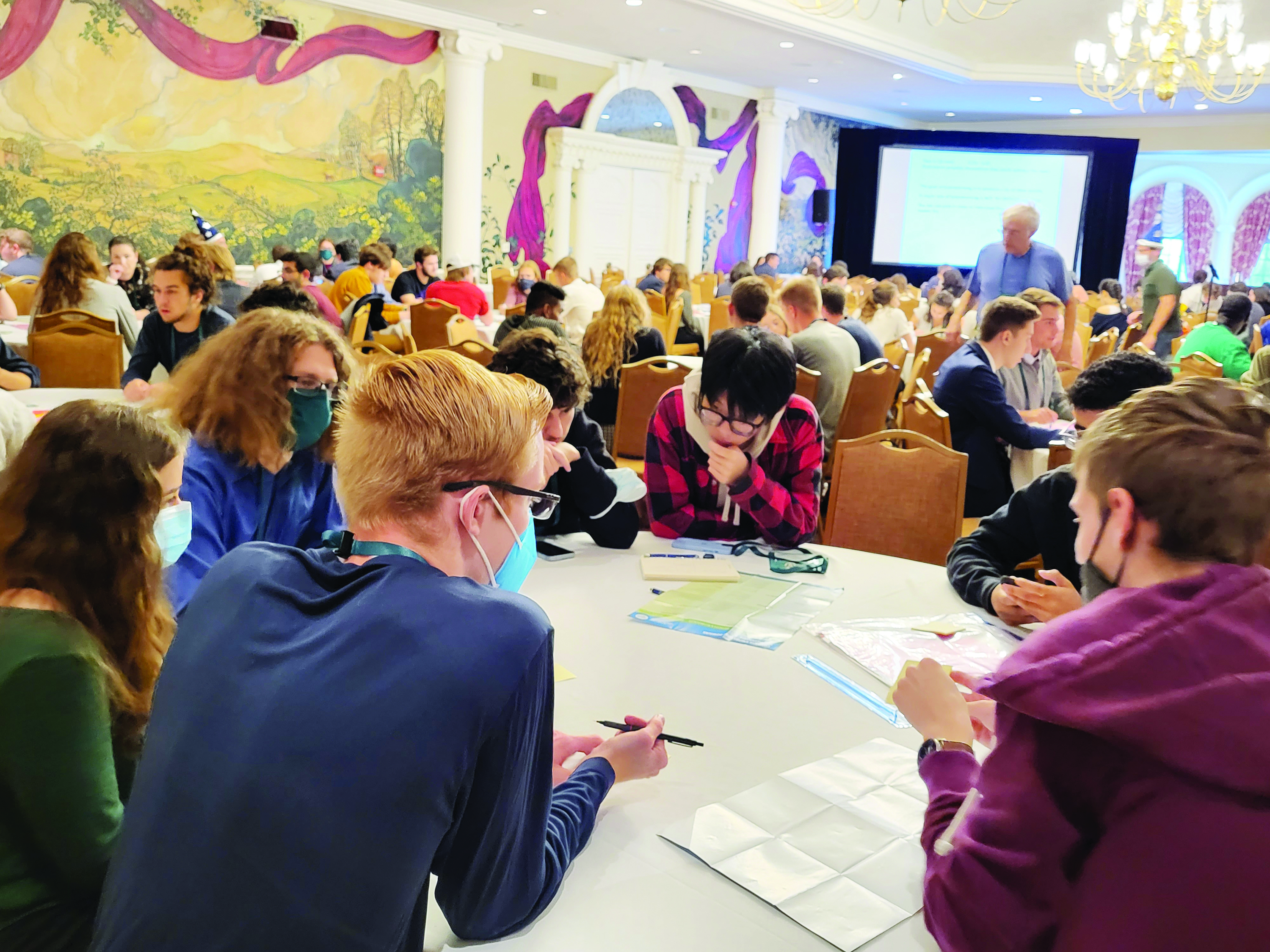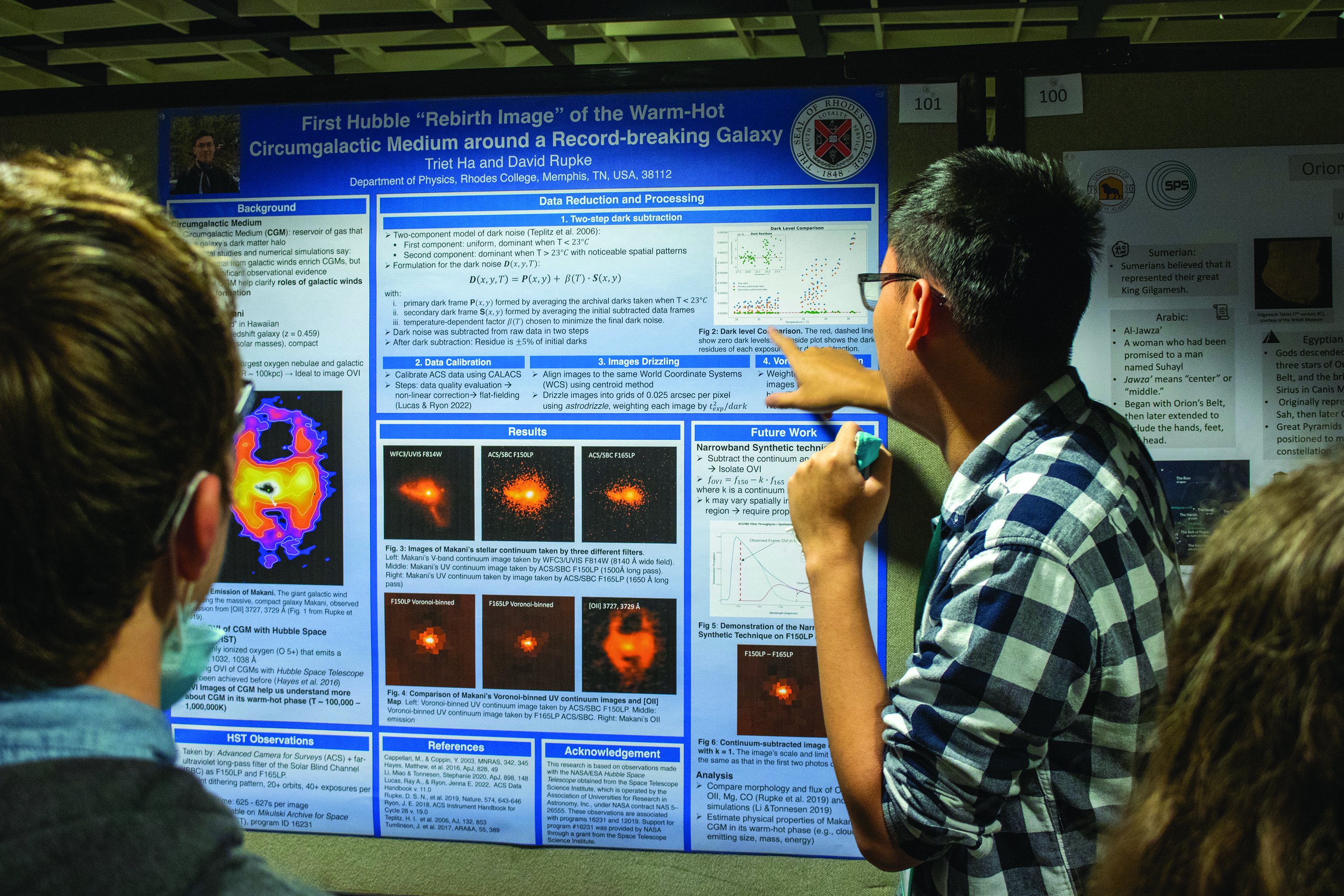Reflections on the 2022 Physics Congress
Spring
2023
Letter
Reflections on the 2022 Physics Congress
Aidan Keaveney, Associate Zone Councilor Representative, 2022–23 SPS Executive Committee, Appalachian State University
The Physics Congress is the triennial gathering of undergraduate students, faculty, and professionals in the physics and astronomy community to celebrate our love of physics and astronomy, discuss the culture of our fields, and learn from each other. At PhysCon, we reconnect with old friends and make new ones. We present our research and hear from others. We dine with Nobel Prize winners, NASA engineers and scientists, or even members of Congress. And, of course, we take selfies with the life-size cutout of Brad Conrad, the director of SPS, in a spherical cow costume. PhysCon is exhilarating, educational, inspiring, and silly in equal measure. PhysCon is physics and astronomy at its best.
The 2022 Physics Congress was held in Washington, DC, last October. By almost every metric, this PhysCon was the best one yet. In attendance were 950 students and 166 faculty members from a total of 257 schools. Another 60 local scientists and engineers joined us for lunch one day. We had the Avengers: Endgame of academic conference panels in the Centennial Plenary, where Drs. John Mather, Jim Gates, Jocelyn Bell Burnell, and Eric Cornell shared their perspectives on the future of physics and astronomy. We also had arguably the most phun closing event yet: the Physics Phestival.
Perhaps the best way to convey the unique nature of PhysCon is by sharing some of my own experiences.
The first time I spoke to Dr. Jim Gates, some of us students on the SPS Council were taking the centennial speakers to dinner at a nearby Indian restaurant. I walked up to introduce myself and thank him for coming to PhysCon, but I didn’t get past “Hi, Dr. Gates” before he interrupted me. “No no, I’m not Dr. Gates, I’m Jim.” Now I’m from North Carolina, where the appropriate response is “Okay, sorry about that, Dr. Jim,” but Jim was having none of my southern mannerisms. I don’t think he would have let us go to dinner until I called him Jim. Calling such an accomplished scientist by his first name made the experience feel much more relaxed and collegial. Our group had a lovely evening.
Last summer I did an SPS internship on science policy, and I presented a poster on this work at PhysCon. I’ve presented it at other conferences, and I’m usually the only one discussing science policy. But at PhysCon,
I was one of several. During the poster session I spoke to all kinds of attendees, from students who’d never considered science policy as a career, to Dr. Michael Moloney, the CEO of the American Institute of Physics and a former diplomat who worked on the very issues covered in my poster. SPS, almost by definition, attracts students who are compelled to impact their communities positively. Presenting at PhysCon connected me to students doing similar work to advance our field and address the scientific problems of our generation.
One of the best parts of PhysCon was celebrating physics and astronomy with old—and new—friends. I spent an evening discussing undergraduate research while relaxing in a hot tub with a high school classmate and a handful of other SPS council members. Another time, I got coffee with someone who created a platform for Iowa voters to see the science policy positions of candidates running for office. I spent the Physics Phestival reconnecting with SPS interns from last summer, passing around cardboard boxes like yearbooks for all of us to sign. I cheered as friends won awards for their research and artwork. SPS does many things well, but perhaps nothing better than bringing people together in physics, phriendship, and phamily.
On Saturday night I was lucky enough to share a dinner table with Dame Jocelyn Bell Burnell and a few friends. At one point she told us, “Someday, you’ll be the ones naming telescopes after people. I hope you’ll choose to name a thing or two after women.” I then asked what she would want to be named after her. She initially responded with her classic Irish wit, “Well, honestly, I think I’d rather not.” But she went on to explain that she’d used the money from her Breakthrough Prize in Science Award to establish the Bell Burnell Graduate Scholarship Fund, which encourages greater diversity in physics by assisting physics PhD students from underrepresented groups in the United Kingdom, and she’d choose something like that. Lo and behold, the next morning—in my first vote as a new member of the SPS Executive Committee—we approved a new name for the SPS Leadership Scholarship: the Jocelyn Bell Burnell SPS Leadership Scholarship, in recognition of her years of service to SPS.
The Physics Congress isn’t just a series of speakers, workshops, and poster sessions, although it has all those things. It’s the place where the physics and astronomy communities come together, from Nobel Prize winners to first-year undergraduates, to learn from each other. Even I, a starry-eyed senior from the heart of the UNC-Duke basketball rivalry, can call Dr. Jim Gates—a man TurboTax labeled a “genius” in one of its commercials—by his first name, discuss nuclear nonproliferation with a former diplomat, and have dinner with the woman who discovered pulsars—and for whom one of SPS's highest honors is now named.
But perhaps most importantly, at the Physics Congress I connected with some of the best and brightest of the first generation to grow up with social media; the generation that will put humans on another planet; the generation that went to college on Zoom; and the generation that will be on the business end of climate change. We face problems that, left unexamined, will reshape humanity for the worse. PhysCon reminded me, and I hope this reminds all of you, that no generation is better equipped to face those problems than ours. And as physics and astronomy students, we are well positioned to face these challenges and find solutions. I look forward to being reminded of that once again in Denver, Colorado, for the 2025 Physics Congress. I hope to see you there.




